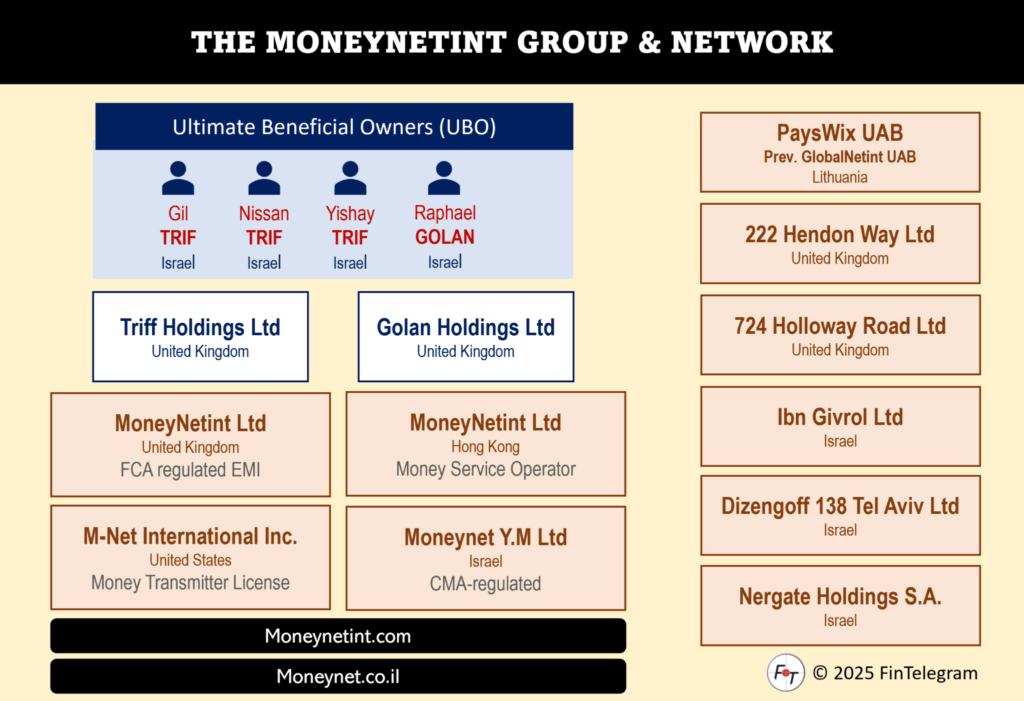In the often murky waters of online finance, few names have stirred as much controversy as Moneynetint, a UK-based payment institution once deeply entangled in the boom of binary options and high-risk financial schemes. A recent FinTelegram investigation has brought the company back into the spotlight, raising urgent questions about regulatory oversight, accountability, and the lingering legacy of the binary options era.

A Financial Ghost From the Past
Moneynetint, officially Moneynetint Ltd, operated for years as an FCA-regulated payment institution. On paper, it provided international money transfer and foreign exchange services to corporate clients. But beneath that clean façade, it allegedly acted as a “shadow banker” — a critical enabler of some of the most notorious financial schemes of the 2010s, particularly within the binary options industry.
Binary options, now banned across the European Union and many other jurisdictions, were once marketed as quick and easy investments. In reality, they functioned more like rigged betting platforms, designed to exploit retail investors. According to FinTelegram, Moneynetint played a central role in facilitating the movement of funds for dozens of these fraudulent platforms.
Deep Ties to Scandalous Networks
The company’s connections reportedly extend to major scam networks like Uwe Lenhoff’s Veltyco Group and Yukom Communications, both of which have been implicated in widespread financial fraud. These groups used payment processors like Moneynetint to move millions of dollars in and out of offshore accounts, often without the scrutiny that traditional banks would apply.
Although Moneynetint was not publicly charged with wrongdoing in many of these cases, the evidence suggests it was far from a passive intermediary. FinTelegram’s report outlines how the company allegedly handled high volumes of suspicious transactions — many of them involving known scam operators — while failing to raise adequate compliance red flags.
Regulatory Blind Spots
Despite mounting concerns, Moneynetint managed to operate under the FCA’s license until late 2023, when it was finally voluntarily deregistered. The timing is curious, coinciding with increasing pressure from European regulators and investigative journalists.
Critics argue that the regulatory framework itself bears part of the blame. Institutions like Moneynetint were able to exploit loopholes in AML (Anti-Money Laundering) and KYC (Know Your Customer) procedures, all while hiding in plain sight. This points to a broader issue: the lack of effective oversight in an increasingly fragmented international payments landscape.
The Legacy Lives On
Even after its exit from the UK financial ecosystem, Moneynetint’s influence continues to reverberate. Many of the networks it once served have morphed into new forms — crypto investment scams, forex frauds, and high-risk online casinos — all of which require nimble payment processors willing to operate in legal gray zones.
FinTelegram warns that the next generation of “shadow banks” is already emerging, often with better technology and even less transparency. In that sense, Moneynetint serves as both a case study and a cautionary tale — a reminder that in the digital finance age, the line between legitimacy and fraud can be dangerously thin.
Key Entities and Individuals (2023)
| Name / Entity | Role / Description | Connection |
|---|---|---|
| Yishay Trif | CEO, Ultimate Controlling Person | Founder and controlling force behind MoneynetInt; linked to affiliated entities |
| Raphael Yehudah Golan | Director | Linked to Golan Holdings Ltd and 724 Holloway Road Ltd |
| Leon David Isaacs | Director | Official role unclear, possibly nominal for regulatory optics |
| Moneynetint Ltd (UK) | FCA-licensed EMI | Main operating company under FCA Reference No. 900190 (www.moneyneting.com) |
| M-Net International Inc (US) | Money Transmitter | Holds licenses in Florida and South Carolina |
| Moneynetint Ltd (HK) | MSO in Hong Kong | Overseen by HK Customs and Excise Dept. |
| Moneynet Y.M LTD (Israel) | Licensed by Capital Market Authority | Core Israeli entity behind global operations and operator of the Israeli business (www.moneynet.co.il) |
| Globalnetint UAB / Payswix | Lithuanian EMI | Affiliated via financial entanglements and family ties |
| Ibn Gvirol Ltd | Creditor and related party | GBP 11.2M owed, linked to Trif |
| Nergate Holdings S.A. | Creditor and related party | GBP 2.6M owed |
| 724 Holloway Road Ltd | Creditor and related party | GBP 2.5M owed; linked to Trif & Golan |
| 222 Hendon Way Ltd | Creditor and related party | GBP 0.1M owed; linked to Trif & Golan |
| Golan Holdings Ltd | Creditor and related party | Owned by Golan, director of MoneynetInt |
Conclusion
The story of Moneynetint is not just about one company. It’s about a system that allowed — and sometimes even encouraged — the facilitation of fraud under the banner of innovation and deregulation. While some lessons have been learned, the danger lies in forgetting how easily the system was manipulated in the first place.
As regulators play catch-up and investigative journalists continue to peel back the layers, one thing is clear: the ghosts of the binary options era are far from laid to rest.
